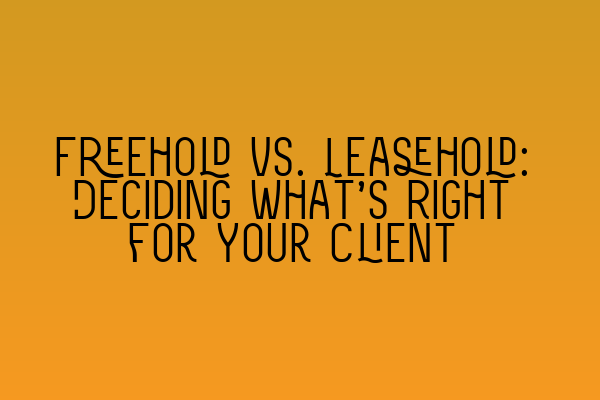Freehold vs. Leasehold: Deciding What’s Right for Your Client
As a property law solicitor, it is crucial to understand the key differences between freehold and leasehold property ownership. This knowledge will enable you to provide the best advice to your clients so they can make informed decisions about their real estate investments. In this blog post, we will explore the meaning, advantages, and considerations of freehold and leasehold ownership, helping you guide your clients towards the right choice.
Understanding Freehold Ownership
Let’s start by examining freehold ownership. When a property is freehold, it means that the owner has complete and absolute ownership of both the land and the buildings on it. In other words, they hold the property in perpetuity, without any limitations or expiry.
The Advantages of Freehold Ownership
There are several advantages that come with freehold ownership. Firstly, there is no ground rent to pay, as the property owner is the outright owner of both the land and the buildings. This offers financial stability to the owner, as they do not have to worry about increasing ground rent charges that often come with leasehold properties.
Furthermore, freehold ownership provides absolute control over the property. The owner has the freedom to make any changes or modifications to the property without seeking permission from a landlord or a leasehold management company. This autonomy can be appealing to clients who want the flexibility to customize their property according to their preferences.
Considerations for Freehold Ownership
While freehold ownership offers numerous benefits, it is essential to consider certain factors before advising your clients. One crucial aspect is the responsibility for property maintenance and repairs. As the sole owner, the freeholder is solely responsible for the upkeep of the property. This means that they are liable for any associated costs, which can be substantial.
Another consideration is the potential difficulty in selling freehold properties in certain areas. In some cases, leasehold ownership may be more common in a particular locality, making freehold properties less desirable to prospective buyers. Therefore, it is important to analyze the local market conditions when advising clients on freehold ownership.
Understanding Leasehold Ownership
Moving on to leasehold ownership, this refers to a situation where an individual purchases the right to occupy a property for a fixed period, typically between 99 and 999 years. However, the land on which the property stands remains under the ownership of a landlord or a freeholder.
The Advantages of Leasehold Ownership
One significant advantage of leasehold ownership is the potential to purchase a property at a more affordable price. Leasehold properties are often more accessible to first-time buyers or those with a limited budget, as they require a smaller upfront investment compared to freehold properties.
Leasehold ownership also offers the benefit of shared responsibilities. In most cases, maintenance and repair obligations are shared among multiple leasehold property owners through a management company. This lighter burden can be appealing to clients who prefer not to worry about the day-to-day maintenance of their property.
Considerations for Leasehold Ownership
While leasehold ownership has its benefits, it is crucial to highlight the potential drawbacks to your clients. One key consideration is the payment of ground rent and service charges. Leasehold property owners are typically required to pay an annual ground rent to the freeholder and contribute to the maintenance and management of shared areas. These ongoing costs can increase over time, potentially impacting the financial feasibility of leasehold ownership.
Additionally, leasehold owners may face restrictions when it comes to property alterations and renovations. Significant changes often require permission from the freeholder, and in some cases, this consent can be difficult to obtain. It is important to educate your clients about these limitations so that they can make informed decisions regarding leasehold ownership.
Making the Right Choice for Your Client
When advising your clients on whether to opt for freehold or leasehold ownership, it is crucial to consider their specific circumstances and goals. Some clients may prioritize the financial stability and control that comes with freehold ownership, while others may value the affordability and shared responsibilities offered by leasehold ownership.
By discussing the advantages and considerations of both options, you can help your clients weigh up the pros and cons and make an informed decision. Remember to stay up-to-date with the latest regulations and legal changes surrounding freehold and leasehold ownership to provide accurate and reliable advice.
Conclusion
Freehold and leasehold ownership represent two distinct approaches to property ownership, each with its advantages and considerations. As a property law solicitor, it is your responsibility to guide your clients towards the right choice based on their unique circumstances. By discussing the advantages, considerations, and potential implications of freehold and leasehold ownership, you can empower your clients to make informed decisions that align with their long-term goals.
Related Articles:
For SQE 1 practice exam questions, check out our SQE 1 Practice Exam Questions article.
Looking for SQE 1 practice mocks? Our SQE 1 Practice Mocks FLK1 FLK2 guide provides comprehensive preparation materials.
Preparing for the SRA SQE exams? Explore our SQE 2 Preparation Courses to ensure success.
Get ready for SQE 1 with our SQE 1 Preparation Courses to build a strong foundation.
Stay informed about the latest SRA SQE exam dates by visiting our SRA SQE Exam Dates page.
Remember to consult with a professional solicitor for personalized advice tailored to your specific situation.
